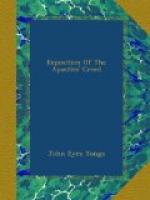to ask them to intercede for us with the Father, for
we believe there is but one Mediator between God and
man. We do not invest them with attributes which
belong to God alone; all that we are warranted to say
about their relation to us is, that what is revealed
does not forbid, but rather encourages, the thought
that they are interested in us and concerned for our
happiness. If the angels rejoice over the conversion
of a sinner, are we to think that the spirits of just
men made perfect are strangers to this joy? They
are within the veil, we cannot see them, but we know
they are in communion with God. The condition
of the departed saints is one of waiting as well as
of progress. They have not attained to fruition.
There are doctrines which to them, as to us, are still
matters not of experience but of faith and hope.
The souls of the martyrs seen by John under the altar
were in a state of expectation, desiring and pleading
as when in the flesh they had desired and pleaded
for the consummation of Messiah’s kingdom; and
from them the Apostle heard the cry ascend, “How
long, O Lord?"[197] Saints here and saints who have
passed through the valley into the unseen must surely
hold many beliefs in common. Both alike believe
the promises of God, and anticipate the glorious consummation
for which they wait and watch, when the kingdoms of
this world shall become the kingdoms of the living
God. They believe in the resurrection of the
body and in its reunion with the soul for ever.
They have common affections. Their love is given
to the same God. They have community of worship,
and have communion in thanksgiving, praise, and, may
we not say, in prayer for the overthrow of the kingdom
of darkness and the advent of the kingdom of glory?
As those who are still in the body keep the New Testament
feast, they feel that there is fellowship between
them and saints departed, seeing that they honour
the same Saviour, glory in the same cross, partake
of the same heavenly food, and look for the same inheritance
of perfect blessedness.
* * * *
*
ARTICLE 10
The Forgiveness of Sins
The Creed acknowledges God as the Father Almighty,
Maker of heaven and earth; but there is another relation
which He sustains to His creatures besides those of
Creator and Father. In Scripture He is represented
as the King, Ruler, Governor of the universe, who
imposes laws upon all His creatures, and requires
of them scrupulous obedience. With the exception
of man, the visible creatures have these laws, from
which they cannot swerve, within their constitutions.
The planet never deviates from its appointed orbit;
the insect, the bird, the beast all live in strict
accordance with their instincts; but, unlike them,
man possesses freedom of will and power of choice.
This freedom, if rightly exercised, is a noble possession,
but, perverted, it is an instrument of destruction.




